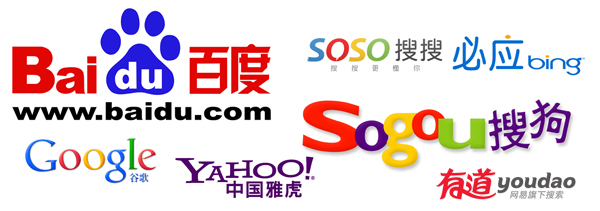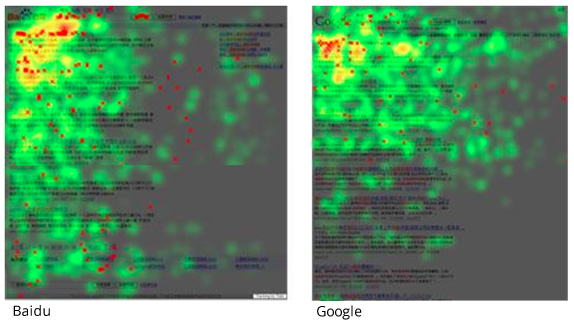China Search Engines

As promised in previous articles , today we will talk about the Chinese market for search engines and its main players, as well as a little touch on the features of Chinese SEO. Based on my research for one investment fund, as well as the experience and opinions of experts in this field.
Chinese search engines
To begin, consider the main players in this market. Over the past few years, the market structure has not changed much; we can say that the market is divided between the “monopolist” Baidu, which occupies two-thirds of the “pie”, and everyone else. By 2013, the situation was as follows:
- Baidu.com (百度) with a share of 65% to 80%,
- So.com (360 搜索) - 16-17%
- Sogou.com (搜 狗) - 9-10%
- Soso.com (搜 搜) - 3-3.5%
- Google.cn (谷 歌) - 2-3%
- Bing.cn (必 应) - 0.4-0.5%
- Yahoo.cn (中国 雅虎) - 0.2-0.4%
- Youdao.com (有道) - 0.2%
Youdao
A small search engine from a major Internet portal NetEase (网易, 163.com). It began as an online dictionary with offline versions for PCs and phones. I myself have not seen living people who use this search engine, but the box on 163.com was at one time for many Chinese the first email. NetEase is now known for its online games. Most likely the traffic is taken from these main directions of the company. Youdao used to be a Google partner until the latter was kicked out of the Chinese market. Now Qihoo.com has become a partner, but this has not affected the Youdao stake yet.
Yahoo.cn
Long-suffering Yahoo. It all started with attempts to become a media portal, but only search survived until 2013 (recently the mail and music service were turned off). As you know, Alibaba is listed in strategic partners. At the same time, no special active steps were taken by the Alibaba Group to promote it. But who knows, maybe this is a "black horse"? It seems that if you wish, Ma Yun 1 can pull Yahu out at least in the Top 5.
Bing.cn
A relatively young search engine for the Chinese market, behind which Microsoft stands. However, even the availability of such support did not allow Bing to shoot. Search quality in Chinese is disgusting. Even local representatives of the company claim that Bing has a chance to occupy a narrow niche in the English search for Chinese users (alluding to the fact that Baidu does not look well in English). Nevertheless, some experts say that Microsoft has leverage to quickly change the situation by promoting the search engine through its products (for example, through Internet Explorer).
Google.cn

About the conflict between Google and the Chinese authorities, and its subsequent collapse, much has been said and written. The search engine continues to lose its share in the Chinese market. According to my expert colleagues, now Google in China uses: a) geeks and people working in international trade; b) to advertise adwords / adsense and attract foreign customers; c) a part of users of Android phones (the share in the mobile search market is 7.5%).
Will the situation recover in the near future? It's hard to say, but so far I do not recommend my customers paying attention to Google for promotion on the Chinese Internet.
Soso.com
Search engine from Internet giant Tencent (腾讯), creator of the popular QQ messenger and WeChat (微 信), the social network QQ Zone, QQ Games and many other projects. The main traffic comes from the same products. Until 2009, he used Google search technology, now references to this are everywhere removed. In mobile search, it ranks second (14-15%).
Sogou.com
The third most popular search engine in China. It is owned by a major Internet portal Sohu (搜狐), and the aforementioned Ma Yun invested in it (it has a 16% stake). He quickly gained his share due to Sohu products, including: Sogou Input (搜 狗 输入 法) - a smart hieroglyph input system, and secure browsers based on Chrome and IE. But the most interesting thing is that the rumors about the purchase of Sogou by Qihoo, the owner of "search engine number 2", have recently been confirmed.
So.com
And here is the proof that even in such a monopolized market of search engines as the Chinese one can break through, having ingenuity and “a little” money. And, although the company is surrounded by numerous scandals about the "unclean" game with competitors and investors, the winners are not judged. Their search engine So.com entered the arena in 2012, and now it owns 17% of the market. How did this happen?
The founder of the search engine, Qihoo 360 (奇 虎 360), is a software developer known for its antivirus products, mobile app store, and numerous add-ons. But most importantly, their software is aimed at a multimillion-dollar audience of owners of pirated copies of Windows in China. 360 programs allowed you to install OS updates bypassing authentication, and made the computer relatively safe by replacing IE6 with your Safe Browser. Naturally, with these add-ons, the default page was the Qihoo site, and with it the main search. It is not surprising that 80% of search traffic on Qihoo comes from applications (browser and toolbar), and only 20% directly from so.com and other channels.
Now Qihoo continues to grow, cooperates with Google and Nokia in the field of mobile search and plans to enter the markets of other countries (a few months ago there was an active hiring of foreign employees in the company). And after the purchase of competitor Sogou, we can expect an increase in the share in China by another 8-10%.
Baidu.com
And finally, the main dish is Baidu.com. According to various estimates, 65 to 80% of Internet users in China use it. The history and description of all the company's web services deserves a separate article. So, only in the search field they have more than a dozen products (and also their projects in Japan and Indonesia). And it will not be a big mistake to say that all of "Chinese SEO" is twisted around Baidu. Therefore, I propose on this to finish the description of the players and go to the story about the features of search engine optimization in China.
SEO in China: Baidu Indexing
Some tips for quickly getting your site into the Baidu index:
Make sure you have quality
- made site with competent Chinese (English sites are also indexed, but much worse). There are robots.txt and everything is fine there (write the address on the Sitemap in the same place).
- Suggest a site for indexing here .
- Create an account in Baidu and register your site on the Baidu Zhanzhang page (analogous to Google Webmaster or Yandex.Webmaster), confirm the ownership and send the XML-map of the site in the Sitemap section (do not confuse it with the 死 链 提交 section - this is a map of “dead links” to remove from the index).
- Be patient, it can take 2 to 4 weeks to index.
And now the details:
In previous articles it was already said that Baidu indexes sites located on foreign servers much worse. The official position is this: Baidu indexes and then ranks sites according to numerous parameters, including server response speed. And for many it is no secret that in China a small channel is allocated for foreign traffic. Therefore, if you want to get into the index faster and be higher - transfer the site to China, or at least to Hong Kong.
Get the ICP license for the site. Officially: its presence does not affect indexing. But in practice, ICP helps Baidu solve a good site or a bad one faster (if approved by the government = good), and puts it faster / higher.
Positioning and rating in Baidu
In short, we can say that, like with other search engines, many parameters are evaluated: the uniqueness and quality of content, the number of external links and the rating of referring sites, the "density" of keywords and so on. Perhaps, it’s only the situation with density that is somewhat freer: if in Google / Yandex for a large number of keywords you can get a “centimeter” of text with a “banhammer”, then Baidu looks at it more simply. And the main role in the ranking is played by link-building and the number of external links.
It should be noted right away that SEM and paid advertising in Baidu (Baidu PPC, 百度 推广) do not affect indexing / positioning in any way. But since Baidu has no conscience and the advertising space is on top of the display, bottom, side and in the middle (until recently they almost did not differ from the usual results, but now they have a different background), this moment is very important not to miss. You can invest hundreds of thousands of yuan in SEO and be in the first "organic" place, but it will be the fifth (and recently the tenth) place on top of paid results. Some experts say that 80% of users do not know that these are paid results. And those who know, by inertia, click in the middle or lower results. But there it was, even the lower results can be bought.
If we compare the “heat maps” of the Google and Baidu results pages, we can see that Google is actively clicking on the first three lines. In Baidu, a large number of clicks are smeared in the center and bottom lines.

In general, Baidu has long had a reputation on the one hand of an active pro-government censor, and on the other, a monopolist in search, whose extradition has been sold more than half. Now, geeks are mostly indignant about this, but dissatisfaction is beginning to grow among ordinary Internet users. Baidu is trying to slowly improve his reputation, but competitors do not miss the opportunity to somehow play on this fact.
***
Here, perhaps, we will stop and leave a place for the second part about SEO and SEM in China (for the offtopic hub). I look forward to your comments, additions and questions, which we will answer in the next part.
Notes
- Ma Yun (马云, Jack Ma) is the founder of the Chinese ecommerce giants Alibaba.com, Taobao, Tmall, Alipay payment system and many other projects.
